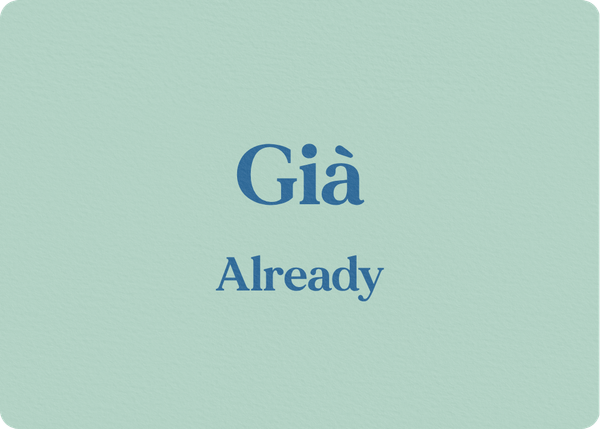Già
ADVERB
Meaning and English translation 🔖
Already
🇬🇧 Indicates that at the time of speaking, something has already happened or is happening.
🇮🇹 Indica che nel momento in cui si parla, un fatto è ormai compiuto o si sta compiendo.
Example sentences 💬
È già quasi Natale. Il tempo vola!
Is it almost Christmas already. Time flies!
Ho già visto questo film almeno tre volte.
I've already seen this movie at least three times.
"Vuoi una fetta di torta?"
"No, grazie. L’ho già mangiata."
"Would you like a slice of cake?"
"No, thanks. I've already eaten it."
"Hai già finito i compiti?"
"No, non ancora."
”Have you already finished your homework?”
”No, not yet.”
This article is brought to you by Giulia School, where you can learn Italian the natural way—with real conversations and passionate teachers guiding you every step of the journey. It’s the closest thing to immersion you can get without living in Italy. Click here to learn more.
Idioms with già 🇮🇹
Di già?!
→ Already?! (expressing surprise)
Hai finito i compiti? Di già?!
Have you finished your homework? Already?!
Già!
→ Indeed! / Right! / Of course!
"È una bella giornata, vero?"
"Già!"
"It's a beautiful day, isn't it?"
"Indeed!"
Già… / Eh già…
→ Yeah...
Expressing thoughtful agreement, and perhaps a bit of reluctance or resignation about the fact. It's more nuanced than a simple "yes".
"Dovremmo studiare di più per passare l’esame."
"Già..."
"We should study more to pass the exam."
"Yeah..."
NB: Did you notice that, in this case, già acknowledges the truth of the statement while possibly suggesting "I know we should, even though we might not want to"?
Già che ci siamo
→ Since we're at it / While we're at it
Già che ci siamo, prendiamo anche il pane.
While we're at it, let's get some bread too.
È già tanto se…
→ It's a miracle if / It's a good thing if... (often used ironically)
"Riesci a tornare a casa per cena?"
"È già tanto se riesco a tornare a mezzanotte!"
"Can you make it home for dinner?"
"It's a good thing if I can even make it back by midnight!"
Già che sei in piedi
→ Since you're up
Già che sei in piedi, mi prendi un bicchiere d'acqua?
Since you're up, could you get me a glass of water?
Non già... ma
→ Not... but rather
L'ho fatto non già per dovere, ma per piacere.
I did it not out of duty, but rather for pleasure.
Già + nome
→ Formerly / Ex
Il signor Rossi, già direttore della banca, ora fa il volontario.
Mr. Rossi, formerly the bank manager, now volunteers.
L'hotel "Belvedere", già "Pensione Maria", è stato completamente ristrutturato.
The "Belvedere" hotel, formerly "Pensione Maria", has been completely renovated.
Where does the word già come from? 🔎
Già comes from the Latin iam, which had the same meaning of immediacy and temporal anteriority.





